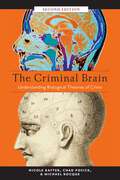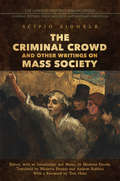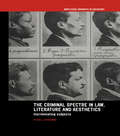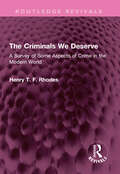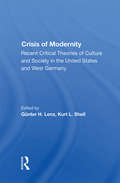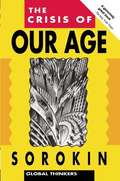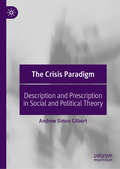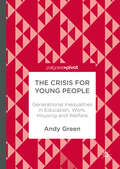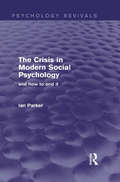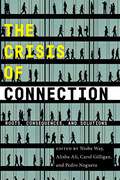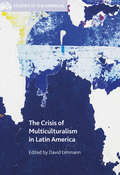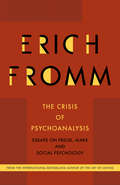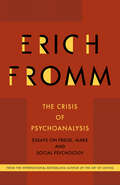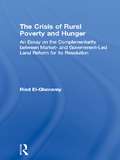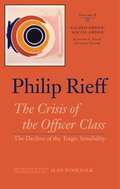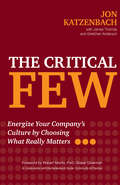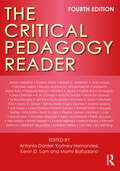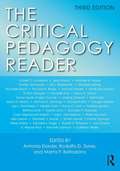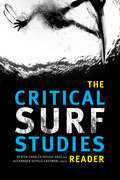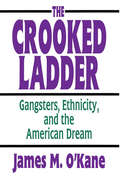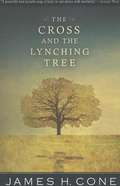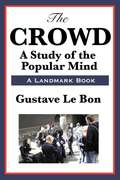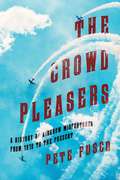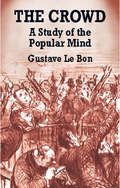- Table View
- List View
The Criminal Brain, Second Edition: Understanding Biological Theories of Crime
by Nicole Rafter Chad Posick Michael RocqueA lively, up-to-date overview of the newest research in biosocial criminology What is the relationship between criminality and biology? Nineteenth-century phrenologists insisted that criminality was innate, inherent in the offender’s brain matter. While they were eventually repudiated as pseudo-scientists, today the pendulum has swung back. Both criminologists and biologists have begun to speak of a tantalizing but disturbing possibility: that criminality may be inherited as a set of genetic deficits that place one at risk to commit theft, violence, or acts of sexual deviance. But what do these new theories really assert? Are they as dangerous as their forerunners, which the Nazis and other eugenicists used to sterilize, incarcerate, and even execute thousands of supposed “born” criminals? How can we prepare for a future in which leaders may propose crime-control programs based on biology? In this second edition of The Criminal Brain, Nicole Rafter, Chad Posick, and Michael Rocque describe early biological theories of crime and provide a lively, up-to-date overview of the newest research in biosocial criminology. New chapters introduce the theories of the latter part of the 20th century; apply and critically assess current biosocial and evolutionary theories, the developments in neuro-imaging, and recent progressions in fields such as epigenetics; and finally, provide a vision for the future of criminology and crime policy from a biosocial perspective. The book is a careful, critical examination of each research approach and conclusion. Both compiling and analyzing the body of scholarship devoted to understanding the criminal brain, this volume serves as a condensed, accessible, and contemporary exploration of biological theories of crime and their everyday relevance.
The Criminal Crowd and Other Writings on Mass Society (Lorenzo Da Ponte Italian Library)
by Tom Huhn Nicoletta Pireddu Scipio SigheleThe Criminal Crowd and Other Writings on Mass Society is the first English collection of writings by Italian jurist, sociologist, cultural and literary critic Scipio Sighele. Sighele is largely responsible for providing post-unification Italy with a new outlook on issues ranging from the blurring line between individual and collective accountability, the role of urbanization in the development of criminality, and the emancipation of women. This work draws a multifaceted portrait of a provocative thinker and public intellectual caught between tradition and modernity during the European fin de siècle. Containing a comprehensive introduction by the editor, The Criminal Crowd and Other Writings on Mass Society includes Sighele’s seminal work, The Criminal Crowd, as well as his formative studies on group behaviour. Nicoletta Pireddu contextualizes Sighele’s contribution to the so-called ‘age-of crowds,’ from the fierce polemic with his French rivals Gustave LeBon and Gabriel Tarde to the scientific, literary, and cultural developments of his conceptualization of mass behaviours as a legitimate object of psychological investigation into a new century.
The Criminal Spectre in Law, Literature and Aesthetics: Incriminating Subjects (Routledge Advances in Sociology #2)
by Peter J. HutchingsThis book analyses the legal and aesthetic discourses that combine to shape the image of the criminal, and that image's contemporary endurance. The author traces the roots of contemporary ideas about criminality back to legal, philosophical and aesthetic concepts originating in the nineteenth century. Building on the ideas of Foucault and Walter Benjamin, Hutchings argues that the criminal, as constructed in places such as popular crime stories or the law of insanity, became an obsession which haunted nineteenth century thought.
The Criminals We Deserve: A Survey of Some Aspects of Crime in the Modern World (Routledge Revivals)
by Henry T. RhodesFirst published in 1937, The Criminals We Deserve asks what kind of criminals does our society deserve? Some people thought that our crime problem was less serious than formerly. Mr. Rhodes, on the other hand, shows how profound changes which took place in our social institutions during the thirty years before 1937, had altered the nature of modern crime, making it more dangerous to society. He explains how our social organization determined the nature of our crime problem, and illustrates his thesis with many strange and arresting examples of criminal behaviour in which tragedy and comedy are often mingled. This book will be of interest to students of criminology, history and sociology.
The Crisis Of Modernity: Recent Critical Theories Of Culture And Society In The United States And West Germany
by Gunter H. Lenz Kurt L. ShellThe crisis~ of the "project of modernity" (Habermas) is, at the same time, a crisis of critical theories of society and culture that have radically questioned bourgeois culture and capitalist society and economy from the perspective of a utopia of enlightened rationality. A number of parallel recent social and political problems, developments, and
The Crisis Of Our Age
by Pitirim A. SorokinThis is an analysis of the nature, causes and consequences of the crisis of modern society. Professor Sorokin asserts that the whole of modern culture is undergoing a period of transition brought on by the struggle between the forces of the largely outworn materialistic order and the emerging, creative forces of a new idealistic order. On the outcome of this struggle, the author contends, rests the progress and survival of mankind.
The Crisis Paradigm: Description and Prescription in Social and Political Theory
by Andrew Simon GilbertThis book examines how 20th century theorists have used a discourse of “crisis” to frame their conceptualizations of modernity. Through an investigation of four key thinkers (Georg Lukács, Hannah Arendt, Reinhart Koselleck and Jürgen Habermas), Gilbert argues that scholars in the social sciences and humanities should be cautious of treating crises as explananda for research. Instead, the book calls for sociological analysis of the role of “crisis” within social scientific discourse, and examines how “crisis” has been used as a conceptual frame for legitimating theoretical agendas. Gilbert’s “sociology of concepts” approach presents crisis as a paradigm of modern thought, and, more generally, reflects on how concepts can become the carriers of diverse intellectual traditions and debates. The Crisis Paradigm will be of interest to students and scholars of social and critical theory, politics, sociology and history, as well as those working in the fields of media studies, communication and discourse analysis.
The Crisis for Young People
by Andy GreenThis book is open access under a CC BY 4. 0 license. This book provides an original and challenging analysis of one of the most pressing social issues of our times: intergenerational inequality. Based on recent mixed-method research, it explores the extent and scope of generational divides through an up-to-date analysis of the changing opportunities for young people in Britain across different life domains. A central question addressed is whether current changes are best understood as growing inequalities within and across age groups, or whether we face a genuine intergenerational decline over the life course of this and future generations of youth. Andy Green's controversial manifesto for intergenerational equity includes replacing higher education fees with a tax on graduates of all ages; the introduction of capital gains tax on sales of first homes; voting at 16, and a new charter of rights for private tenants.
The Crisis in Modern Social Psychology: and how to end it (Psychology Revivals)
by Ian ParkerIn the late 1960s a ‘crisis’ erupted in social psychology, with many social psychologists highly critical of the ‘old paradigm’, laboratory-experimental approach. Originally published in 1989, The Crisis in Modern Social Psychology was the first book to provide a clear account of the complex body of work that is critical of traditional social psychological approaches. Ian Parker insisted that the ‘crisis’ was not over, showing how attempts to improve social psychology had failed, and explaining why we need instead a political understanding of social interaction which links research with change. Modern social psychology reflects the impact of structuralist and post-structuralist conceptual crises in other academic disciplines, and Parker describes the work of Foucault and Derrida sympathetically and lucidly, making these important debates accessible to the student and discussing their influence. He assesses the responses from both mainstream social psychology and from avant-garde textual social psychology to the influx of these radical ideas, and discusses the promises and pitfalls of a post-modern view of social action.
The Crisis of Connection: Roots, Consequences, and Solutions
by Edited by Niobe Way, Alisha Ali, Carol Gilligan, and Pedro NogueraUncovers the roots and consequences of and offers solutions to the widespread alienation and disconnection that beset modern society Since the beginning of the 21st century, people have become increasingly disconnected from themselves, each other, and the world around them. A “crisis of connection” stemming from growing alienation, social isolation, and fragmentation characterizes modern society. The signs of this crisis of connection are everywhere, from decreasing levels of empathy and trust, to burgeoning cases of suicide, depression and loneliness. The astronomical rise in inequality around the world has contributed to the critical nature of this moment. To delve into the heart of the crisis, leading researchers and practitioners draw from the science of human connection to tell a five-part story about its roots, consequences, and solutions. In doing so, they reveal how we, in modern society, have been captive to a false story about who we are as human. This false narrative that takes individualism as a universal truth, has contributed to many of the problems that we currently face. The new story now emerging from across the human sciences underscores our social and emotional capacities and needs. The science also reveals the ways in which the privileging of the self over relationships and of individual success over the common good as well as the perpetuation of dehumanizing stereotypes have led to a crisis of connection that is now widespread. Finally, the practitioners in the volume present concrete solutions that show ways we can create a more just and humane world. In a time of social distancing and enforced isolation, it is more important than ever to find ways to bridge the gaps among individuals and communities. The Crisis of Connection illuminates concrete pathways to enhancing our awareness of our common humanity, and offers important steps to coming together in unity, even across distances.
The Crisis of Multiculturalism in Latin America
by David LehmannThis book presents a challenging view of the adoption and co-option of multiculturalism in Latin America from six scholars with extensive experience of grassroots movements and intellectual debates. It raises serious questions of theory, method, and interpretation for both social scientists and policymakers on the basis of cases in Mexico, Brazil, Argentina, Bolivia, and Ecuador. Multicultural policies have enabled people to recover the land of their ancestors, administer justice in accordance with their traditions, provide recognition as full citizens of the nation, and promote affirmative action to enable them to take the place in society which is theirs by right. The message of this book is that while the multicultural response has done much to raise the symbolic recognition of indigenous and Afro-descendant peoples nationally and internationally, its application calls for a profound reappraisal in spheres such as land, gender, institutional design, and equal opportunities. Written by scholars with long-term and in-depth engagement in Latin America, the chapters show that multicultural theories and policies, which assume racial and cultural boundaries to be clear-cut, overlook the pervasive reality of racial and cultural mixture and place excessive confidence in identity politics.
The Crisis of Psychoanalysis
by Erich FrommThis book brings together Erich Fromm's basic statements on the application of psychoanalytic theory to social dynamics. At the same time it offers an image of man consonant with the hopes of radical humanism. The Crisis of Psychoanalysis is a collection of nine brilliant essays. Although his work is deeply rooted in Freudian theory, Fromm further develops Freud's doctrines by including both social and ethical dimensions and applies his discoveries and insights to address the problems we face in society at large.
The Crisis of Psychoanalysis: Essays on Freud, Marx and Social Psychology
by Erich Fromm&“This book is must reading . . . although it will at times shock and perhaps even offend the sensibilities of traditional therapists.&” —American Journal of Psychiatry This book brings together Erich Fromm&’s basic statements on the application of psychoanalytic theory to social dynamics. At the same time, it offers an image of man consonant with the hopes of radical humanism.The Crisis of Psychoanalysis is a collection of nine brilliant essays. Although his work is deeply rooted in Freudian theory, Fromm further develops Freud&’s doctrines by including both social and ethical dimensions, and applies his discoveries and insights to address the problems we face in society at large. &“This collection is a fine representative sampling from a lucid, humane, always attractive writer.&” —Kirkus Reviews &“Highly recommended.&” —Library Journal
The Crisis of Rural Poverty and Hunger: An Essay on the Complementarity between Market- and Government-Led Land Reform for its Resolution (Routledge Studies In Development Economics Ser.)
by M. Riad El-GhonemyM. Riad El-Ghonemy argues that if current trends in government-led and market based land reforms persist the rural poor population in developing countries will continue to rise.Based on nearly half a century of academic and field research this valuable work presents compelling evidence on persistent rural poverty, hunger and increased inequality in
The Crisis of the Officer Class: The Decline of the Tragic Sensibility (Sacred Order/Social Order #2)
by Philip Rieff<p>Philip Rieff earned recognition as one of the most profound social theorists of culture and authority of the twentieth century. Through such works as Freud: The Mind of the Moralist and The Triumph of the Therapeutic, he proved himself an incisive interpreter of Freud and his legacy. His work now culminates with the long-awaited trilogy, Sacred Order/Social Order, a three-volume work on social theory and contemporary culture. <p>In Volume 2, The Crisis of the Officer Class: The Death of the Tragic Sensibility, Phillip Rieff continues his assault against the deathworks of our modern age. Invoking his theory developed in Volume 1, he develops his critique of our current culture as distinguishable only by its rejection of any and all visions of sacred order.</p>
The Critical Few: Energize Your Company’s Culture by Choosing What Really Matters
by James Thomas Jon R. Katzenbach Gretchen AndersonIn a global survey by the Katzenbach Center, 80 percent of respondents believed that their organization must evolve to succeed. But a full quarter of them reported that a change effort at their organization had resulted in no visible results. Why? The fate of any change effort depends on whether and how leaders engage their culture: the self-sustaining patterns of behaving, feeling, thinking, and believing that determine how things are done in an organization. Culture is implicit rather than explicit, emotional rather than rational--that's what makes it so hard to work with, but that's also what makes it so powerful. For the first time, this book lays out the Katzenbach Center's proven methodology for identifying your culture's four most critical elements: traits, characteristics that are at the heart of people's emotional connection to what they do; keystone behaviors, actions that would lead your company to succeed if they were replicated at a greater scale; authentic informal leaders, people who have a high degree of "emotional intuition" or social connectedness; and metrics, integrated, thoughtful measures to track progress, encourage the self-reinforcing cycle of lasting change and link to business performance. By leveraging these critical few elements, you can tap into a source of catalytic change within your organization. People will make an emotional, not just a rational, commitment to new initiatives. You will elicit enthusiasm and creativity and build the kind of powerful company that people recognize for its innate value and effectiveness.
The Critical Pedagogy Reader
by Antonia Darder Kortney Hernandez Kevin D. Lam Marta BaltodanoSince its publication, The Critical Pedagogy Reader has firmly established itself as the leading collection of classic and contemporary essays by the major thinkers in the field of critical pedagogy. While retaining its comprehensive introduction, this thoroughly revised fourth edition includes updated section introductions, expanded bibliographies, and up-to-date classroom questions. The book is arranged topically around such issues as class, racism, gender/sexuality, language and literacy, and classroom issues for ease of usage and navigation. New reading selections cover topics such as youth activism, agency and affect, and practical implementations of critical pedagogy. Carefully attentive to both theory and practice, this new edition remains the definitive source for teaching and learning about critical pedagogy.
The Critical Pedagogy Reader (Third Edition)
by Rodolfo D. Torres Antonia Darder Marta P. BaltodanoFor fifteen years, The Critical Pedagogy Reader has established itself as the leading collection of classic and contemporary essays by the major thinkers in the field of critical pedagogy. While retaining its comprehensive introduction, this thoroughly revised third edition includes updated section introductions, expanded bibliographies, and up-to-date classroom questions. The book is arranged topically around issues such as class, racism, gender/sexuality, critical literacies, and classroom issues, for ease of usage and navigation. New to this edition are substantive updates to the selections of contemporary readings, including pieces that reflect issues such as immigrant and refugee students, the role of social justice in teacher education, and an emphasis on practical elements of pedagogy, as well as it significance to forging democratic life. Carefully attentive to theory and practice, this much-anticipated third edition remains the definitive, foundational source for teaching and learning about critical pedagogy.
The Critical Surf Studies Reader
by Alexander Sotelo Eastman Dexter Zavalza Hough-SneeThe evolution of surfing—from the first forms of wave-riding in Oceania, Africa, and the Americas to the inauguration of surfing as a competitive sport at the 2020 Tokyo Olympics—traverses the age of empire, the rise of globalization, and the onset of the digital age, taking on new meanings at each juncture. As corporations have sought to promote surfing as a lifestyle and leisure enterprise, the sport has also narrated its own epic myths that place North America at the center of surf culture and relegate Hawai‘i and other indigenous surfing cultures to the margins. The Critical Surf Studies Reader brings together eighteen interdisciplinary essays that explore surfing’s history and development as a practice embedded in complex and sometimes oppositional social, political, economic, and cultural relations. Refocusing the history and culture of surfing, this volume pays particular attention to reclaiming the roles that women, indigenous peoples, and people of color have played in surfing. Contributors. Douglas Booth, Peter Brosius, Robin Canniford, Krista Comer, Kevin Dawson, Clifton Evers, Chris Gibson, Dexter Zavalza Hough-Snee, Scott Laderman, Kristin Lawler, lisahunter, Colleen McGloin, Patrick Moser, Tara Ruttenberg, Cori Schumacher, Alexander Sotelo Eastman, Glen Thompson, Isaiah Helekunihi Walker, Andrew Warren, Belinda Wheaton, Dina Gilio-Whitaker
The Crooked Ladder: Gangsters, Ethnicity and the American Dream
by James M. O'KaneEthnic organized crime is a phenomenon that has been largely ignored by social scientists and historians, and dismissed as a subject not to be taken too seriously by those researching the mobility patterns of their own ethnic ancestors or current minority newcomers. The Crooked Ladder represents a groundbreaking attempt to describe how some members of ethnic minorities have utilized organized crime as one vehicle of upward mobility, advancing from lower-class status to middle-class power and respectability.O'Kane illustrates the criminal road to prosperity as a process of displacement and succession: each group competes with and eventually eliminates its more established predecessor from the upper echelons of organized crime. This historical criminal succession mirrors the upward mobility of the Irish, Jews, and Italians in the larger, conventional noncriminal realm. Arguing that African Americans, Asians, and Hispanics are pursuing similar criminal routes, O'Kane takes issue with contemporary social scientists who view the current plight of minorities as unique in American social life.As a fundamental rethinking of the American ethnic experience with crime, The Crooked Ladder will be essential reading for social historians, sociologists, and criminologists. Now available in paperback, it will be useful in criminology courses and well as classes in ethnicity and social relations.
The Cross and the Lynching Tree
by James H. ConeThe cross and the lynching tree are the two most emotionally charged symbols in the history of the African American community. In this powerful new work, theologian James H. Cone explores these symbols and their interconnection in the history and souls of black folk.
The Crowd
by Gustave Le BonThe Crowd: A Study of the Popular Mind is a brilliant treatise on the workings of crowds. Gustave Le Bon examines many different kinds of crowds and how they work. He differentiates between different kinds of crowds such as mobs, juries, elected bodies, and simple crowds. This landmark book is one of the most influential books ever written on this subject. An important book for anyone studying or working in the fields of sociology, law, and psychology.
The Crowd Pleasers: A History of Airshow Misfortunes from 1910 to the Present
by Peter FuscoAn adventure-filled romp through one of aviation’s most notable, dangerous and entertaining pursuits: airshows! In the early days of aviation, all flights were airshows. Spectators gathered whenever a new flying machine attempted to leave the ground—the trick was to get them to pay. Takeoffs and landings did not sell tickets but people lined up, money in hand, to watch a “dip of death,” in which an aviator would dive from as high as he or she dared and pull up at the last second. Risk always sells and flying was man’s riskiest endeavor yet. From the start the “exhibition pilots” stood out. Everything about an aerobatic routine requires a degree of skill and a commitment to practice inconceivable to even most pilots, presenting innumerable risks to life and limb. And with risk, often, comes tragedy. The Crowd Pleasers is a sweeping history of air show accidents beginning in 1910 with the death of Charles Rolls, co-founder of Rolls-Royce, and ending in the present day. It brings to light some of the most notable air show accidents of all time and explores the aviators behind them. Their stories, their motivations. In so doing, it illuminates the role played by choice, social circumstance and fate in these often devastating accidents, and the lives attached to them. A must-read for all aviation buffs.
The Crowd: A Study of the Popular Mind
by Gustave Le BonOne of the most influential works of social psychology in history, The Crowd was highly instrumental in creating this field of study by analyzing, in detail, mass behavior. The book had a profound impact not only on Freud but also on such twentieth-century masters of crowd control as Hitler and Mussolini — both of whom may have used its observations as a guide to stirring up popular passions. In the author's words, "The masses have never thirsted after the truth. Whoever can supply them with illusions is easily their master; whoever attempts to destroy their illusions is always their victim."Although the volume focuses on crowd psychology, it is also brilliantly instructive on the effects of the generally accepted beliefs of a nation's citizenry on the processes of history. Among the topics covered here are general characteristics and mental unity of the crowd; the crowd's sentiments and morality; its ideas, reasoning power, and imagination; opinions and beliefs of crowds and the means used by leaders to persuade; classification of crowds, including criminal and electrical assemblages, as well as the functioning of criminal juries and parliamentary assemblies.A must-read volume for students of history, sociology, law, and psychology, The Crowd will also be invaluable to politicians, statesmen, investors, and marketing managers.
